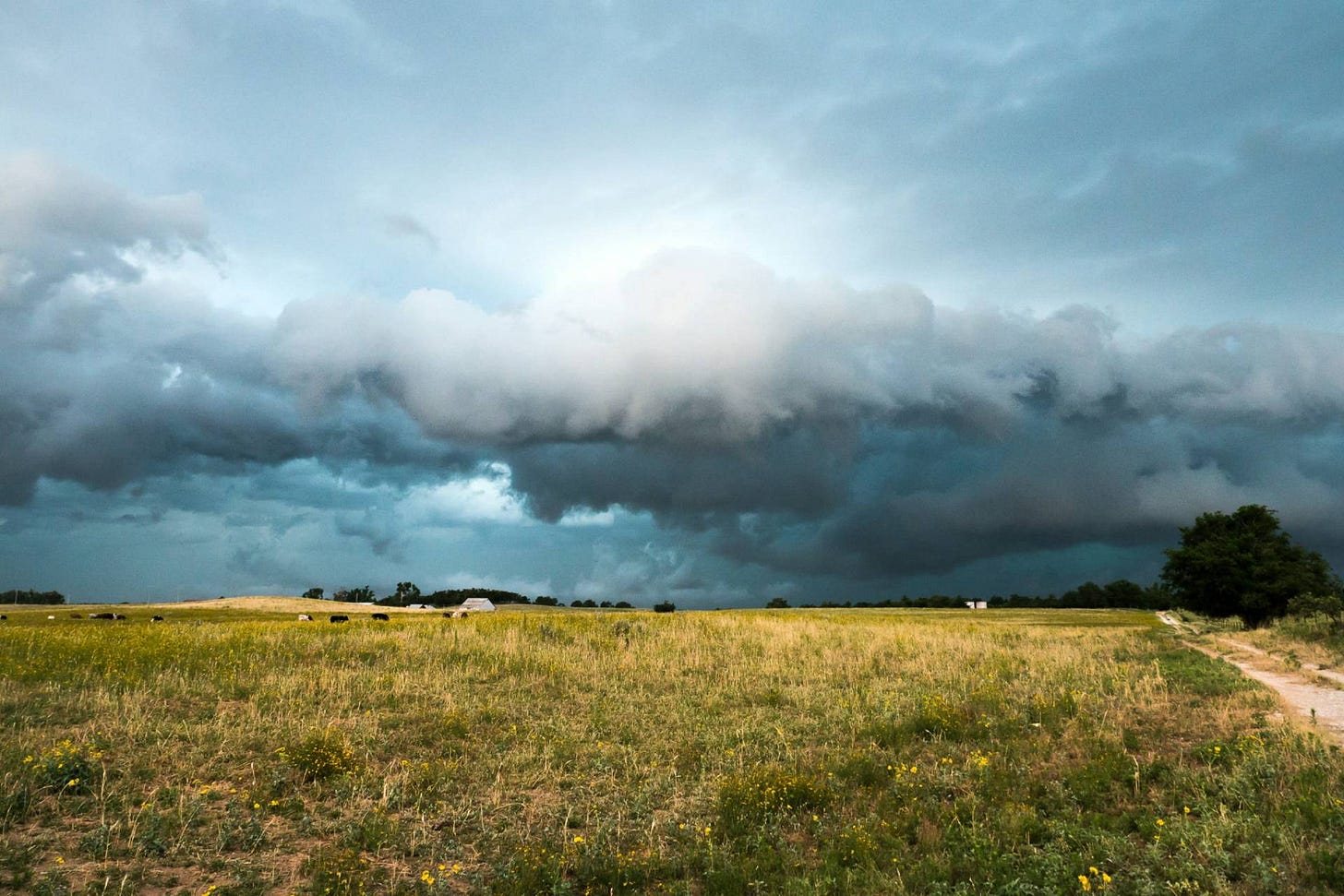
The first time, I was at church, preparing for a meeting. The weather alert flagged a notification on my phone’s lock screen: severe weather this afternoon. It was the sort of notice I’d long ago learned to ignore, like tornado watches (wait for the warning because that means one has been spotted) and the daily flood warning we get in this area whenever it rains. I had come to see the word severe with the relativity of low probability. That it isn’t that the weather service is overreacting — just that it so rarely amounts to anything.
It is probably worth noting that I don’t have a cavalier attitude toward the weather. It is more the case of naïveté and growing up in a part of the country where the only really severe weather we ever saw involved snow.
We had an afternoon meeting set for 2:00. Two of my colleagues had ghosted my request and the third arrived with something best described as concern. She asked if people were safe, if we ought to consider meeting in a room with fewer windows. I nervously checked the updated forecast — ten to fifteen minutes of extreme weather, winds up to 85 mph. Is that real?
The sky grew dark with uncanny speed, we heard the winds howling along window surfaces and the creaking of trees. Then the rain.
It was the call from Rose that woke me to it, asking about our son, who was eleven, home alone, who had never experienced anything like this before. He had called her, asking what to do. He was scared.
Parents know this feeling. It is unique to the parent-child relationship, I suspect, or perhaps innate to it. It is similar to the concern we have for loved ones, but carries a different color and shape, design. Add to that additional shades when he is neurodivergent and has anxiety. Fear overcame me with additional shades of guilt and self-hating rage for not taking it more seriously, not planning to protect my son.
The storm was barely ten minutes. We packed up and I drove home through an obstacle course of fallen branches in the road, downed powerlines, and carnage I’ve never seen live, fresh, here.
It took nearly a week for the crews to restore power to our part of town and another week before we had internet restored. It was a shocking event that we could chalk up to “our turn.” This was two years ago. When about the same thing happened nearly the same exact time last June, and again, our son was home alone, and the shame and guilt returned, we asked each other, “is this how it is now?”
There is coincidence, of course. But we have plenty of data rejecting that response, as it is, itself a rejecting response — rejecting the possibility, the likelihood, that the incredibly unlikely, the thing that never happened, that doesn’t happen here but once a century is, in fact, something that now does happen. Something we ought to prepare for.
This is the thought, isn’t it? How we would treat virtually anything else. It is, after all, how businesses and nations treat economic conditions — we respond to the new forces and factor them into future equations. We recognize that the market is changing, so we adapt.
This, too, is changing. So we must adapt.
I’m now looking at the month of June with far greater wariness, like Kansas with tornados and Florida with hurricanes — that we are developing a season here in central Indiana with storms and winds. Events that topple trees that stood for a century, each ring marking a year that will not predict the next, like out-of-date data from the previous iteration of life.
Can we plan trips in June? Dare we leave town, given the prospects, the potential danger? What next comes of our lives and the traumas we’ve earned through survival? New fears of creaking and cracking and things slamming into our home in the middle of the day, and then, like a ghost, the shadows recede as quickly as they came.
The answer, of course, is that we live. And tomorrow? We’ll likely see that too.
Be well!
Drew
Daring Read: Life After Doom
This is a reflection from my journaling as I read Life After Doom by Brian McLaren; a book that starts at the end and then talks about after. If you want to join with me, read along (I wrote up the schedule here). Or join the weekly Zoom check-in or in-person office hours for those who live local (or want to visit!).
On the Podcast
Check out my podcast, which you can find in any podcast app.
In the most recent episode, I suggest that the idea that something being called “controversial” doesn’t necessarily mean that it actually is. And who benefits from this lazy label. You can also catch it on YouTube.
Over on the blog
I explore power and the desire for control.
Here is a sermon for Ash Wednesday and one about the Transfiguration and what comes after.
dreaming is a newsletter about the brave act of dreaming in a culture of now. Join in the revolution.



